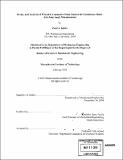Design and analysis of wearable conductive fiber sensors for continuous multi-axis joint angle measurements
Author(s)
Gibbs, Peter T., 1981-
DownloadFull printable version (4.575Mb)
Other Contributors
Massachusetts Institute of Technology. Dept. of Mechanical Engineering.
Advisor
Haruhiko Harry Asada.
Terms of use
Metadata
Show full item recordAbstract
The practice of continuous, long-term monitoring of human joint motion is one that finds many applications, especially in the medical and rehabilitation fields. There is currently a lack of acceptable devices available to perform such measurements in an accurate and non-intrusive way for a patient over a long period of time, and so a new wearable sensor has been developed. A novel technique of incorporating conductive fibers into flexible, skin-tight fabrics surrounding a joint is used. Resistance changes across these conductive fibers are measured, and directly related to specific single or multi-axis joint angles through the use of a nonlinear predictor after an initial, one-time calibration. These wearable sensors are comfortable, and acceptable for long-term wear in everyday settings. Because these sensors are intended for multiple uses, an automated registration algorithm has been devised using a sensitivity template matched to an array of sensors spanning the joints of interest. In this way, a sensor array can be taken off and put back on an individual for multiple uses, with the sensors automatically calibrating themselves each time. Results have shown the feasibility of this type of sensor, with accurate measurements of joint motion for both a single-axis knee joint and a double axis hip joint when compared to a standard goniometer used to measure joint angles.
Description
Thesis (S.M.)--Massachusetts Institute of Technology, Dept. of Mechanical Engineering, 2005. Includes bibliographical references (leaves 54-56).
Date issued
2005Department
Massachusetts Institute of Technology. Department of Mechanical EngineeringPublisher
Massachusetts Institute of Technology
Keywords
Mechanical Engineering.